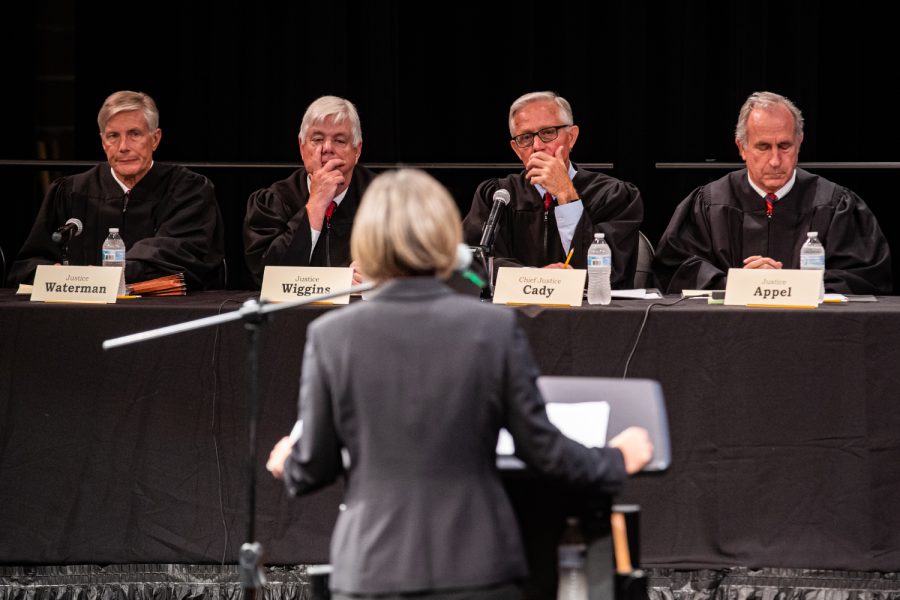Iowa City man imprisoned for Ped Mall shooting appeals conviction to Iowa Supreme Court
The court heard arguments regarding Lamar Wilson’s appeal to reverse his conviction in the 2017 Pedestrian Mall shooting under the “stand your ground” law.
Justices listen to the argument of Melinda Nye in regards to the appeal of Lamar Wilson during a special session of the Iowa Supreme Court in Muscatine, IA on Tuesday, September 10, 2019.
September 10, 2019
MUSCATINE — An attorney on Tuesday asked the Iowa Supreme Court to reverse the conviction of the Iowa City man who was sentenced to prison after the 2017 Pedestrian Mall shooting and claimed immunity under the state’s “stand your ground” law.
Lamar Wilson of Iowa City was charged with voluntary manslaughter, two counts of assault with the intent to cause serious injury, and intimidation with a dangerous weapon in his 2018 trial for the incident that occurred Aug. 27, 2017. Wilson fatally shot one man and injured two others.
Assistant Iowa appellate defender Melinda Nye spoke on Wilson’s behalf at the session at Muscatine High School. She contended that a group of people involved in a conflict with Wilson met with him at the Ped Mall and unlawfully used a weapon.
Wilson had asked 6th District Judge Paul Miller for a pretrial hearing regarding immunity from prosecution. The defendant claimed immunity because of self-defense using the “stand your ground” law, which allows a person to use reasonable force if they believe themselves or others to be in imminent danger. The law went into effect less than two months before Wilson shot three people on the Ped Mall.
This claim to immunity was rejected, and the evidence was to be heard during the trial.
The state justices questioned both Nye and Assistant Attorney General Louis Sloven about the language used in the “stand your ground” statute, including the use of the words “aggressor” and “damages.”
There is no procedural outline in the statute regarding pretrials like the one Wilson had requested. Justices added that the draft of the statute may not work because of poor language.
Nye gave examples of other interpretations of immunity that were granted in previous civil and criminal cases, noting that immunity should be discussed before a trial.
Related:https://dailyiowan.com/2018/03/30/wilson-sentenced-to-24-years-in-prison/
The justices took issue with the idea of having a “mini-trial” before the trial to discuss immunity, arguing it would be costly and require bringing in multiple witnesses at multiple times, slowing down the process.
In response, Nye said most cases won’t be like Wilson’s, which called in 26 witnesses to testify.
“This case is a unicorn in a lot of ways,” she said. “… This case was unusual, I don’t think it’s going to be the norm.”
Justice Edward M. Mansfield also questioned whether Kaleek Jones, the man who was fatally shot, was an aggressor towards Wilson, as the law specifies immunity would be granted if the defendant faced an aggressor.
The people Wilson faced were defined as a group, Nye said, so there was no specification if Jones himself was an aggressor. She also said Wilson saw two weapons being drawn, but it is unclear if they were pointed at him before Wilson drew and fired his weapon.
Sloven said Iowa’s “stand your ground” law doesn’t have the key language that other states have in their statues that grants immunity, unless it can be found beyond a reasonable doubt that the defendant was justified in using force.
“It only makes sense that’s a consequence of fact finding that if found [guilty or not guilty] at the trial by the jury,” Sloven said.
Sloven also added that Wilson admitted to firing the shot that causes Jones’ death. Jones was unarmed, he said, and the two injured men were also unarmed.
By using the “stand your ground” law, Sloven said, aggressors are seeking damages for an aggression they committed.
Because “stand your ground” is a new law in Iowa, there is no precedent upon which to base decisions, Nye said in her rebuttal. She added that pretrials and evidentiary hearings happen frequently in various cases, and ended by asking the justices to reverse Wilson’s conviction.
A ruling on Wilson’s appeal was not made Tuesday night, but will be announced later in a written opinion. The court said the decision will likely come after months of discussion.






